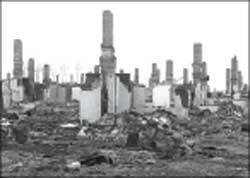
The relics of the fire at Daxinganling Mountains
The report, a part of a series, was published on Page 1 of China Daily on May 16, 1987. China Daily's reports on the fire in Daxinganling Mountains, which reporters Guo Jianshe, Yuan Zhou and Yu Junmin and others covered, garnered the top 1987 National News Award.
By Yu Junmin
An eyewitness account by China Daily's photographer Guo Jianshe gives many revealing details of how people reacted, facing the biggest fire since 1949. It has blazed for 10 days in China's far Northeast Daxinganling Mountains.
On May 10, Guo was among the first group of photographers from Beijing to fly to Jiagedaqi, the forest belt city in which lies the frontline fire-fighting head-quarters.
The city's Cultural Palace had already been turned into a relief centre, where policemen and Communist Youth League members helped to serve porridge and distribute winter clothes and woolen sweaters to 1,500 evacuees from the hard-hit areas of Almu and Tuqiang who had arrived that morning.
Three students said that they had written 70 letters that day for people who were illiterate but who wished to contact their relatives.
Doctors and nurses in white gowns were checking people.
A minibus from a local branch of the China Industrial and Commercial Bank had a red cloth banner running across it saying the evacuees could exchange their badly burned money there.
Guo was amazed to find that a film show was being staged in the evening, to ease the evacuees' homesickness.
Four old men told Guo that they escaped by riding on a truck laden with people. When the driver got hysterical and helplessly turned the truck one way and then another to flee from the scorching flame, it was a steady female voice that counseled loudly, "We should drive straight on beside the high flames to save our livesDon't make any more turns!" Then they were saved.
Guo was lucky enough to catch a north-bound train. Near Almu, all the trees and even the ground on both sides of the railway were scorched and scarred black. Occasionally, some pines on the distant hills could be seen, still green. But as the train rumbled on, there were no more white birches or green pints. It was miraculous that the big oil tanks in Almu were still safe, said Guo.
In the town of Yulin, there were still some buildings that had survived the disaster, including the forest bureau's office. Li Weiqi, the bureau's photographer showed Guo a graveyard where two new, hastily nailed coffins stood. "Two firemen," he said, "from Tuqian, who came to help."
Li said that the forest people were rich, and here they all had colour TV sets, refrigerators, tape-recorders and watching machines. There were even motorcycles and a few privately-owned cars. One driver said that the efficient forest centre leadership had guaranteed a hasty evacuation at night.
A strict regulation says that all governmental cadres should remain in the fire-stricken areas to help put out the remaining fire and to rebuild. All women, children and the elderly were evacuated.
But there is still a family of four husband and wife, son and daughter who insisted on staying in Yulin. The husband, a middle-aged Muslim, said that he had bought 29 buffaloes just before the fire. Now only four were left. The 20,000 yuan notes he kept at home were all ashes. A cadre said: "We are surviving on the roast beef form his buffaloes. He is so kind-hearted that he even killed a live one to feed other hard-hit people."
Knowing that there were still 160,000 yuan in bank notes in the safe, a treasurer of the local police station remained till the last minute when he had to choose between life and death. But before leaving, he was wise enough to take the account books with him, "These are more valuable than the bank notes," he said.
In Tuqiang, Guo Jiangshe visited photographer Li Weiqi's "home." Li said, "When the alarm came, I rushed out to help put out the fire. My wife was so scarred that she could only remember her TV set, not even my cameras and all the negatives of the past 30 years. She asked our son to run back and fetch her TV set. But when the boy got back, he forgot all about the TV and was only concerned about our dog."
A young primary school teacher with thick glasses was in his classroom when the flames came near. He ran off to save his neighbour's two children before going home.
On the way back to Harbin, a railway worker on board the train told Guo Jianshe that the fire reached Tuqiang on the evening of May 7. The next evening, his train reached the town to take the evacuees. He heard the locals shouting, in quivering voices at the station, "Long live the railroad!"
Nearly all the people Guo talked to were not in the mood to give their names or ages, "Their agony and distress was great enough for me to just wish them peace of mind," Guo said.
Meanwhile, the People's Insurance Company of China has already paid 50 million yuan (about $13.5 million) to help restore production and build new homes in the forest fire-affected areas, a company executive said yesterday.
Yu Junmin, 82, worked as China Daily's Features Editor until her retirement in 1990.
Guo Jianshe is a freelance photographer
based in Beijing
(China Daily 05/31/2006 page3)
